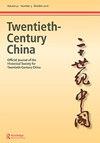War, Disunity, and State Building In China, 1912–1949
IF 0.4
Q1 HISTORY
引用次数: 1
Abstract
Abstract:Xavier Paulès and David Serfass—in their introduction to this special issue—call for greater recognition of the many agents involved in multicentered state-building processes during China's Republican era (1912–1949). This article addresses their intriguing idea by linking it to the theoretical paradigm associated with Charles Tilly (1929–2008), in which states are formed and strengthened through war. The article briefly reviews how Tilly's paradigm has figured in research on China's early twentieth-century era of conflict among regional strongmen and struggle against Japanese invasions. Recounting trends construed as unifying processes, it then reconsiders the idea that the unity of the People's Republic of China (PRC) grew out of regional and central state-building efforts of the Republican period. With an eye to the potential for further analytical exploration of conflicts born of political disunity in China, the article concludes by proposing greater precision in the conceptualization of centralization and continuity in Chinese state-building processes.1912-1949年中国的战争、分裂与国家建设
摘要:Xavier Paulès和David Serfass在本期特刊的引言中呼吁更多地承认中国共和时代(1912–1949)参与多中心国家建设过程的许多代理人。这篇文章通过将其与查尔斯·蒂利(1929-2008)的理论范式联系起来,阐述了他们有趣的想法,在这个理论范式中,国家是通过战争形成和加强的。本文简要回顾了蒂莉的范式在20世纪初中国地区强人冲突和反抗日本侵略的研究中的作用。它回顾了被解释为统一过程的趋势,然后重新考虑了中华人民共和国的统一源于共和党时期的地区和中央国家建设努力的观点。为了进一步分析探索中国政治不团结所产生的冲突,文章最后提出了在中国国家建设过程中更精确地概念化中央集权和连续性的建议。
本文章由计算机程序翻译,如有差异,请以英文原文为准。
求助全文
约1分钟内获得全文
求助全文

 求助内容:
求助内容: 应助结果提醒方式:
应助结果提醒方式:


